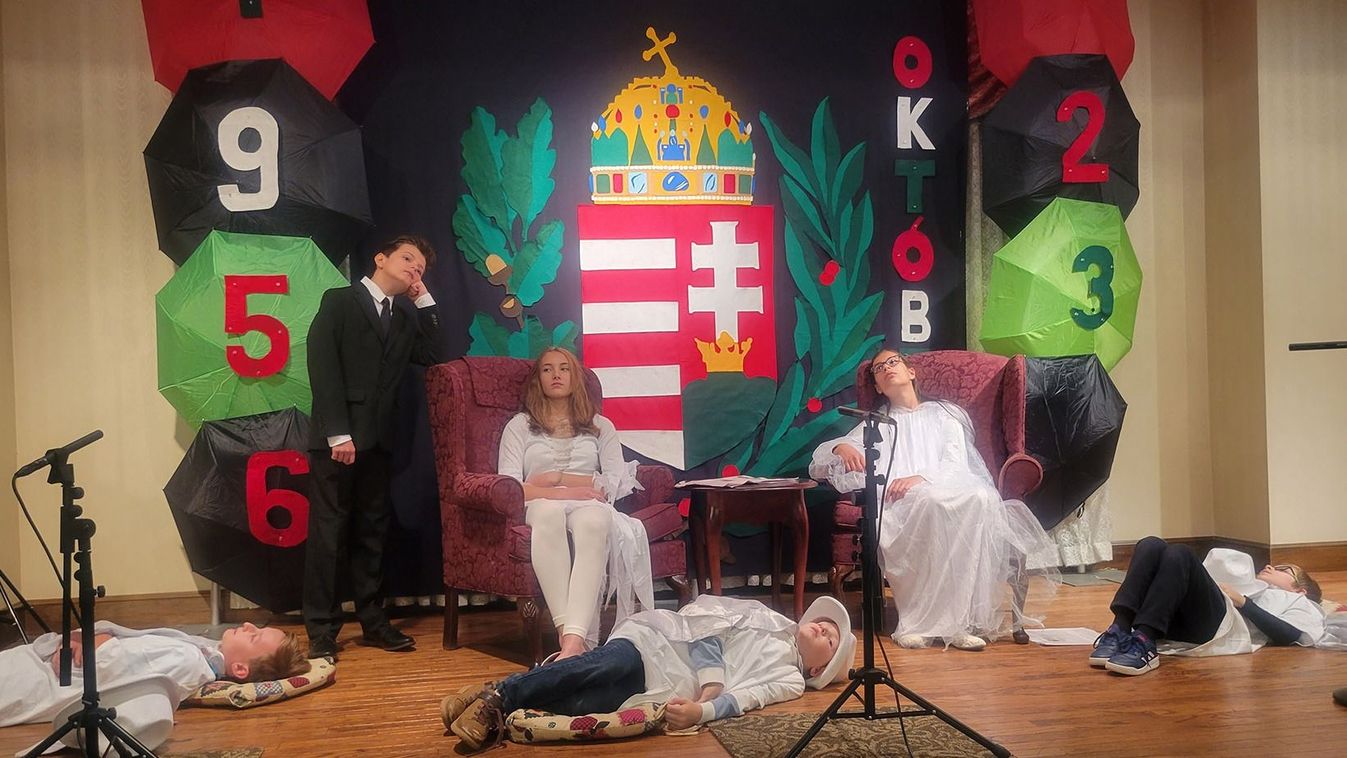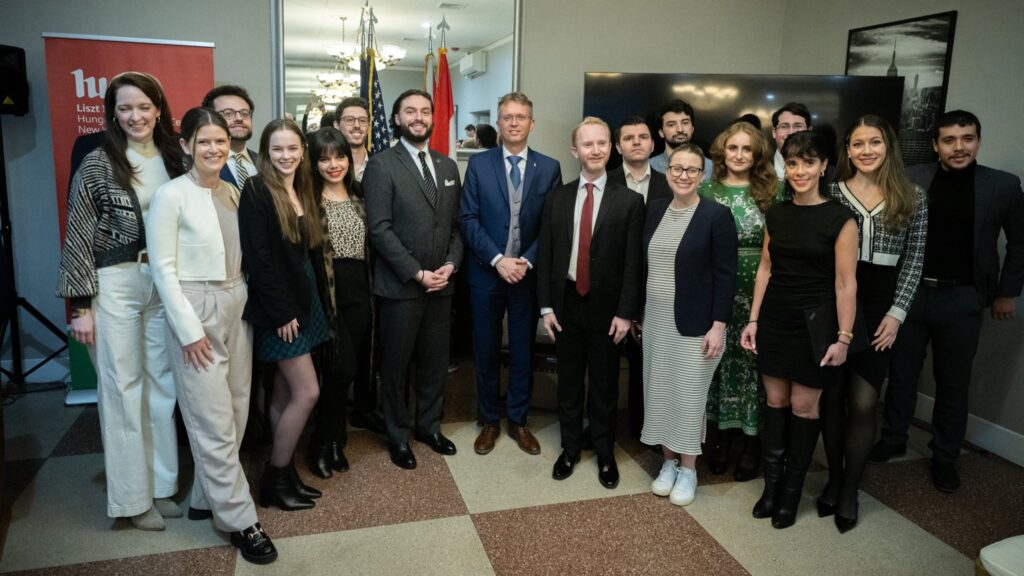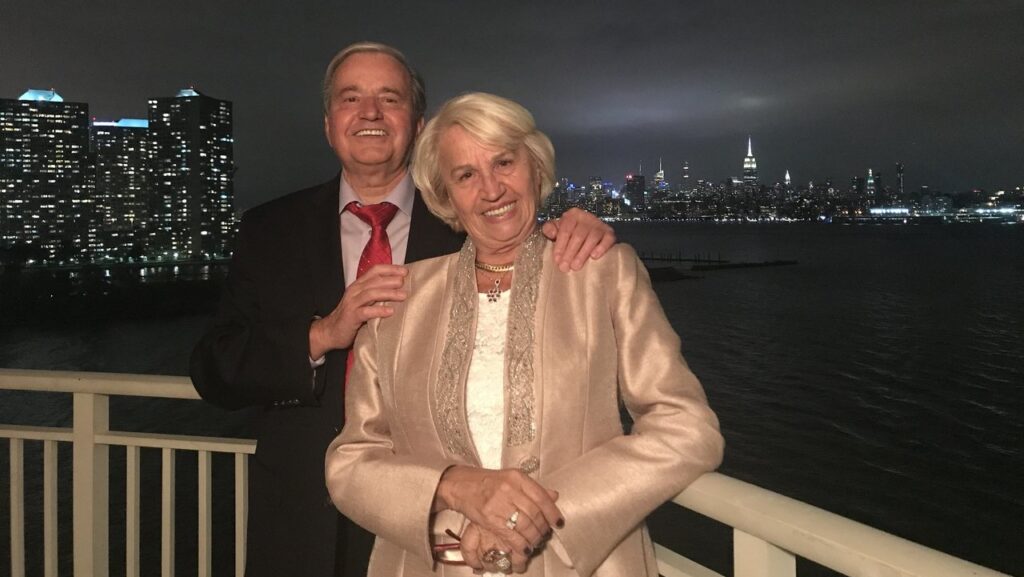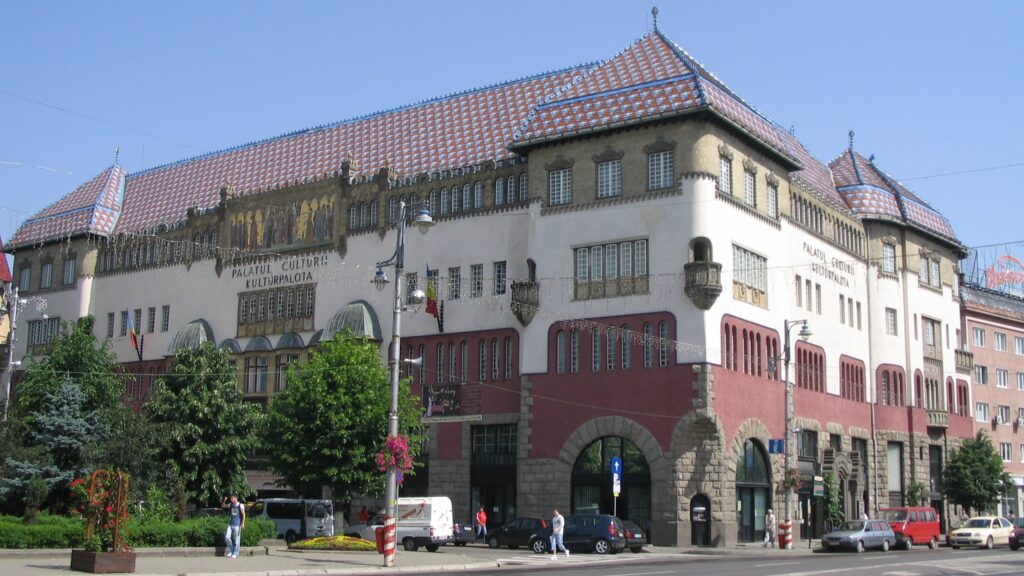This is an abridged version of the original interview published in Magyar Nemzet on 3 March 2024 and online on 29 February 2024.
Beáta Krasznai aspired to be a lawyer but became a teacher and later a licensed professional counselor. She had envisioned spending her life in Hungary, yet she has lived abroad for more than half of it. Having spent over 20 years in America, she still feels 100 per cent Hungarian. Her children were born overseas, yet they speak, read, and write Hungarian fluently and have a strong connection to Hungary. She believes that God’s will led them to Cleveland, Ohio, where they finally settled. She is the founding director of Nebuló Hungarian Language School, which operates within their Reformed congregation and celebrated its 10th anniversary on 2 March 2024.
***
How did your life journey lead from Tokaj, Hungary, to Cleveland, Ohio?
I attended high school in Tokaj, Hungary, then went to a teacher training college in Debrecen before starting my career in Budapest at an elementary school. Since childhood, I had wanted to become a lawyer, and since history was one of my strengths, I applied to the law school at Eötvös Loránd University (ELTE) a few years later. Although I made it to the entrance exam, my legal career remained just a plan. I had known my husband since we both studied in Debrecen, and after we got married, he received job offers as a Reformed pastor first in Toronto, then in Cleveland. We moved to North America, where all three of our children were born.
Although I started the paralegal program in Cleveland, I quit after a few weeks; with my husband’s demanding job and three small children, I couldn’t handle the workload. For the next few years, I focused on raising the children, but I also enrolled in a computer course and volunteered in American schools weekly, mostly assisting math teachers, until I finally applied for a master’s program at Cleveland State University. But by then, I wasn’t considering law anymore; instead, I pursued school counseling, as from the beginning of our time in Cleveland, one of our services among Hungarians was pastoral care. I graduated in 2012, but almost immediately re-enrolled in a clinical counseling program, though I delayed completing it for four years due to my children. It took many years to achieve my career goals, but I have no regrets—I always wanted to raise my children myself. In 2019 I completed my exams and worked in private practice for three years, focusing on marital difficulties, grief and anger management, and anxiety-related issues, through both individual and group therapy. One of the reasons I wanted to counsel adults was that I saw how helping parents directly benefited their children. When adults’ problems decrease and they learn to handle difficult situations, their children’s lives improve too.
How and when did you establish the Hungarian Sunday School and the Nebuló Hungarian Language School?
For many years, my focus was solely on my children and later university studies. During that time, a Hungarian Sunday school was established at our church—First Hungarian Reformed Church, Walton Hills—alongside the existing English one. I didn’t start it myself, but I joined in. Over time, a strong children’s community formed, which remained unchanged until our son Joel turned nine. My eldest daughter, Ráhel, who was 11 then, could read and write in Hungarian by then. However, in preparation for Christmas in 2014, we realized that many children struggled with reading Hungarian. The Christmas program wasn’t progressing as needed, so we had an idea: since the parents were already in church, why not teach their children to read and write Hungarian during that time?
The church supported us, and by the end of 2014, Nebuló Hungarian Language School was officially founded. My husband, along with our accountant and secretary, provided tremendous help, easing my workload. The parents were incredibly supportive, which I always truly appreciated. After all, no matter how much effort we teachers put in, if parents don’t help their children learn, it won’t work. Our rule is simple: no one can go on stage without knowing their lines by heart. Once, we allowed students to write their lines on the back of a stage decoration shaped like a tulip, and the result was that everyone read their lines—even those who had already memorized them!
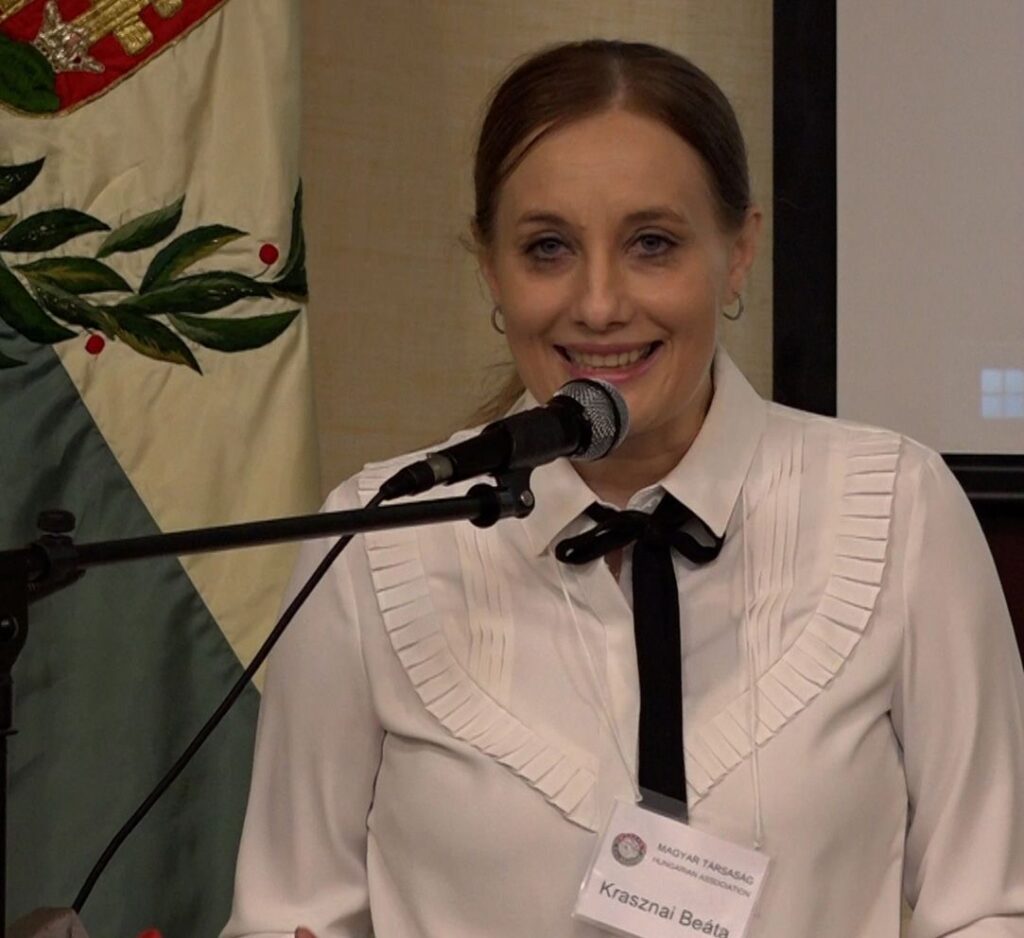
Cleveland already had another, much older Hungarian School. Why was another one needed?
Nebuló was established so naturally that we never questioned the need for it. The reason for founding a new school was primarily logistical—families who attended our church on Sundays didn’t go to the other Hungarian school on the other side of the city. At our church’s 131st anniversary, I reflected on how our ten years compared to the other school’s long history. I realized: history is not necessarily required to do something well. We aim to pass on the kind of Hungarian identity and language teaching that we grew up with. In 2014 I wrote our curriculum based on this philosophy. Initially, it took weeks to plan exercise by exercise, book by book…However, in recent years, textbooks provided by Hungary’s State Secretariat for National Policy have been a great help, allowing teachers to select tasks and adjust the teaching pace.
How many groups do you have? What exactly do you teach?
The number of groups changes yearly; we try to teach based on age groups, which depends on whether we have enough teachers. Scholarship students from the Kőrösi Csoma Program (KCSP) help significantly. We teach weekly and have to carefully decide what to focus on. Counting the 30 minutes when children play outside or have playful lessons on the playground, we spend a total of two and a half to three hours together each week. My youngest daughter, Olívia, learned to read and write at Nebuló—she was my ‘prototype’. It’s a great achievement that, within a school year (from September to May), with just one class per week, I’ve been able to teach children fluent Hungarian reading and writing using my own method and carefully selected textbooks. It’s a challenging task, given the limited time. One of my teaching techniques involves a small song about vowels, which I introduce first. I tell students to ‘play’ the song in their heads if they get stuck. If they struggle to recognize a vowel, they can look at the board and immediately identify its sound. This method greatly helps my current group, who are still learning to read, and the goal is for them to be fluent readers by the end of the year. Additionally, we teach cursive handwriting, which American schools no longer include in their curriculum. We decided to incorporate history and geography basics into every lesson, such as Hungary’s neighboring countries, major cities, mountains, lakes, etc. We make learning fun—for instance, my younger group has a challenge to learn ten historical facts about King Matthias by the end of the year, with a small reward for completion. We strongly believe in the motivational power of rewards, often organizing bake sales to fund small prizes for the children.
How do you motivate the students? How cooperative are the parents?
We frequently involve children in performances—those who don’t attend regularly miss out. We also held reading showcases, which we plan to do twice a year. Parents and guests are invited to see their progress. Students receive ten reading passages of varying difficulty but don’t know which one they’ll have to read aloud at the event. The night before, I discreetly inform parents which passage to practice again. We also emphasize the practical benefits of knowing the Hungarian language: it helps if they travel to Hungary, attend Hungarian camps, etc. While the Hungarian school is not easy for them, in hindsight, they appreciate it. The older children already see the value and enjoy our little community, continuing to attend even as teenagers. Parents and teachers deserve the utmost respect—many travel long distances to come here. In most families, Hungarian practice at home is effective; typically, those who enroll their children with us want them to develop strong Hungarian skills.
I’ve heard it many times, and you also mentioned it at a recent conference: for young adults who were born here or moved to America as small children, it’s completely valid to feel 100 per cent Hungarian and 100 per cent American.
Those who came to America as adults are more likely to continue identifying as fully Hungarian. I wouldn’t be a credible example of an ‘American mom’ because I’m not one. There are many things I love about America—some aspects, I believe, serve as good examples—but I see myself as a Hungarian living abroad. This is natural for us, and I represent this Hungarian identity authentically. That’s why, for one of our 23 October commemorations, I wrote a performance script based on the Hungarian musical Padlás (The Attic). We staged a play where the children were ghosts in the attic, incorporating music from the musical at the right moments. Nagy Imre also appeared as a ghost, telling his story and how he ended up in the attic. Those who were born in Hungary understand this perfectly, but we also want our children to connect with Hungarian culture. One year, for the anniversary of the Reformation, we organized a performance where the children didn’t just portray John Calvin and Martin Luther, but also read funny and fascinating stories about the great figures of the Reformation—like how they hid in barrels and did everything they could to spread their ideas. I believe our school’s strength lies in the fact that we give what we truly are. I deeply respect the parents because they naturally prioritize passing on their native language. They don’t need convincing to want their children to receive even more Hungarian culture. They understand that this is a lifelong task, with no clear end; we can always give more to our children. I firmly believe that this strengthens the parent-child relationship too. Children understand us better if they know our language and culture—whether we are happy or having a disagreement, they shouldn’t be excluded from this because of language barriers.
Parents often complain that their child doesn’t want to speak Hungarian…
A child will speak the language their parents speak to them—it’s as simple as that. Between the two parents, the role of the primary caregiver—typically, but not always, the mother—is crucial because language learning requires time. The language that the child hears the most will be the one they acquire best. Sometimes, a mother speaks Hungarian well but constantly switches to English for various reasons—mixed marriage, convenience, or social conformity—which is understandable but not beneficial for language learning. That’s why I previously emphasized the importance of perseverance and self-discipline. Also, many parents switch to English when their non-Hungarian spouse comes home, yet I see many positive examples where the parent doesn’t feel excluded from the family just because their partner speaks Hungarian to their child. In fact, in some families, the other parent speaks to the child in their own third language, creating a multilingual environment where the child can learn three languages.
Does this mean that the children’s language skills depend on the parents’ attitude, the strength of their relationship, and family communication?
Yes. If someone values language and sees it as an extra asset, they will support bilingual or even trilingual communication. At the same time, families experience various challenges that can change priorities. For example, if they face financial difficulties, health issues, or relationship problems, language preservation may no longer be a priority. If a mixed marriage is unstable, with constant conflicts and a lack of trust, one parent might feel that the other is using the language against them. So, while teaching a native language is extremely important, it must also be acknowledged—with a heavy heart—that family circumstances can make it difficult to maintain Hungarian or any multilingual communication. This is why I believe the idea of being 100 per cent Hungarian and 100 per cent American is not a fixed state but a balancing act that can shift over time.
What About Teenagers?
Peer groups and communities play a key role. My children don’t regularly attend other Hungarian organizations, so the Nebuló community and our congregation are especially important to us. As parents, we must also take active steps to reinforce our children’s Hungarian identity. That’s why we’ve taken them to Hungary so many times, and I hope they will continue to visit with us or even go on their own. Our eldest daughter recently spent three months in Budapest and wants to return to live there permanently. For her, the balance has tipped in the other direction. My son, on the other hand, has connected with this year’s KCSP scholars—young people like him—who further strengthen his sense of belonging and appreciation for speaking Hungarian. But the most important thing is that no one should question another person’s identity, especially the identity of young people growing up here. Their identity is shaped by their environment, school, and friendships. We cannot demand that they be 100 per cent Hungarian. That would be an impossible expectation. For me—because I, like many parents and teachers, have dedicated part of my life to this work—it’s important that my children love Hungary and the Hungarian language. I’m proud that they speak two languages fluently. But we cannot take away from them the fact that they also love the place where they grew up, which is a part of their personality. Having an American identity doesn’t mean they lack a Hungarian one. In fact, I believe they are twice as rich, both emotionally and culturally—if we do it right. My wish is for them to become happy and fulfilled adults, to feel whole, and to know that all parts of their identity are valued: the Hungarian, the American, and any others they may have. That’s why I say so often that we should never pit these two cultures against each other.
‘We strengthen our Hungarian identity by improving language skills and maintaining our love for Hungary…That’s what I pass on through Nebuló’
In our family, we strengthen our Hungarian identity by improving our language skills and maintaining our love for Hungary, our ‘other home’. That’s what I pass on through Nebuló as well. At the same time, I see examples of people who have a strong Hungarian identity without ever visiting Hungary or speaking the language. Those families—whether second, third, or later generations—have found different ways to connect and pass it on.
By language, you also mean culture, right? How does your education differ from the American education system?
Yes, because we teach not only the Hungarian language but also Hungarian geography, history, and culture, often incorporating arts and crafts. You can only love what you know. When we talked about how important it is for children to understand their parents’ way of thinking, this includes understanding where their parents came from. That’s why we are filling a gap.
There’s a lot of criticism of the American education system, but I’ve experienced very few of its negative aspects. To be fair, my children attended strong public and private schools. American schools don’t necessarily teach less than Hungarian schools; they just teach different things. For example, history is covered in detail, but there is minimal European content. In geography, they learn about all the world’s countries, but there’s no mention of Hungarian cities, rivers, or mountains. Nebuló helps fill that gap, too. Some concepts must be repeated multiple times for them to stick. I don’t expect them to list every Hungarian king, but they should know ten and recognize major literary figures like Pilinszky, Arany, or Ady. One year, I even incorporated music into Hungarian education so that names like Liszt, Bartók, and Kodály wouldn’t be unfamiliar to them. Year by year, our program evolved—it wasn’t initially a grand plan. We simply started teaching, and it grew.
Your children have already graduated from Nebuló. Will it still have another ten years?
Two of my children have officially ‘graduated’, but they still participate in classes, so for now, my motivation remains strong. With the others, our goal is that when they receive their high school diplomas, they also earn the Seal of Biliteracy—a recognition awarded for proficiency in a second language. In Hungary, this would be given as a certificate, but here in the U.S., it’s added as a seal on their high school diploma. It officially confirms that they have passed an exam in both written and spoken Hungarian according to Ohio state regulations. This seal is also useful—some universities allow students to convert it into college credit. For those who have officially graduated from Nebuló, we continue to offer an advanced ‘young adult’ group. No matter how well they read and write in Hungarian, spelling remains an eternal challenge—especially the use of j and ly, and distinguishing between ö and ü. Of course, I know that Google can autocorrect their mistakes, but we don’t want to rely on that.
What about the youngest ones? Are there new enrollments?
Yes, we have new families joining this year with school-age children. Additionally, we have many three- and four-year-olds, so we plan to open a preschool group—if we can find a teacher. I phrase it that way because our capacity is limited. I work as a psychologist, I volunteer at the congregation, and our other teachers and trainees are also very busy. Since the little ones are already here every Sunday morning, we’ll make it work. I’ve already ordered a slide projector so we can show them classic Hungarian fairy tales and cartoons. We also plan to have play-dough and painting activities, rhymes, tongue twisters, and rhythmic exercises. This is important because, at this age, they still speak Hungarian fluently, but around age four or five, they may start responding in English. If a parent can’t overcome this phase—by consistently speaking Hungarian with them and providing a Hungarian-speaking community—the child may lose interest in using Hungarian altogether.
‘We provide a community where it feels good to speak Hungarian, where it feels good to be a Nebuló student’
And if a child enjoys preschool, they will likely want to attend school too, right?
Yes, but continuing school depends entirely on their parents’ perseverance. When a child wakes up in the morning and whines that they’re tired and don’t want to go, and the parent is also exhausted, the big question is: What does the parent reply? How do they decide? Without commitment, Hungarian school is neither possible nor worthwhile. For example, I stopped taking my children to another Hungarian organization’s events because I lacked the internal motivation—I didn’t feel like it was ours. Instead, I chose to do fewer things, but to do them very well.
When and how will Nebuló celebrate its 10th Anniversary?
On 2 March, Saturday. We debated a lot about what kind of event it should be. In Cleveland, we are used to big Hungarian commemorations and celebrations. In the end, we decided to do something unconventional and unique. Thank God, the Reformed church has plenty of space, with a large hall that we can divide into a children’s area and an adult section. I hope the children will really enjoy the multi-station activities, where they can complete different tasks and pick small prizes afterward. The adult section will feature photos and decorations about the school, while the tables will have board games and other activities. Last year, the KCSP scholars organized a board game night, which was a huge success—we should continue that. Of course, in true Hungarian tradition, there will be food and drinks, but in a more casual and informal way. A long speech wouldn’t fit the occasion, but by celebrating the children, it will be clear who we are and what we represent. I think this type of relaxed, interactive celebration suits our school because our philosophy is this: no weekend school or organization can teach Hungarian without the parents’ involvement, but we provide a community where it feels good to speak Hungarian, where it feels good to be a Nebuló student.
Read more Diaspora interviews:

